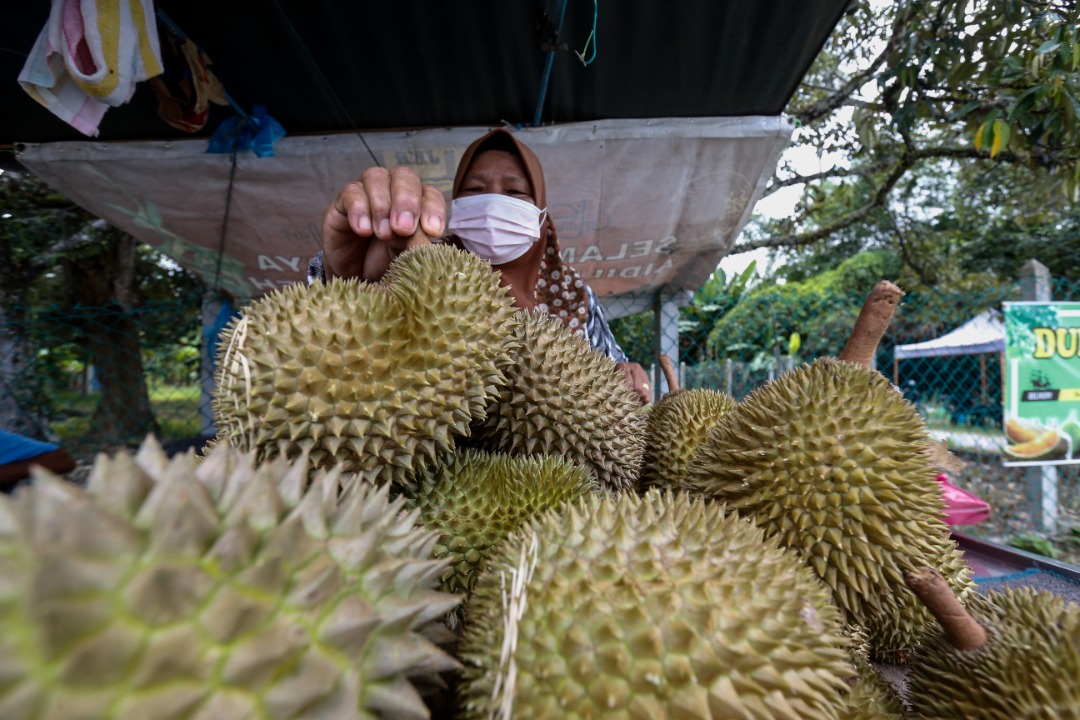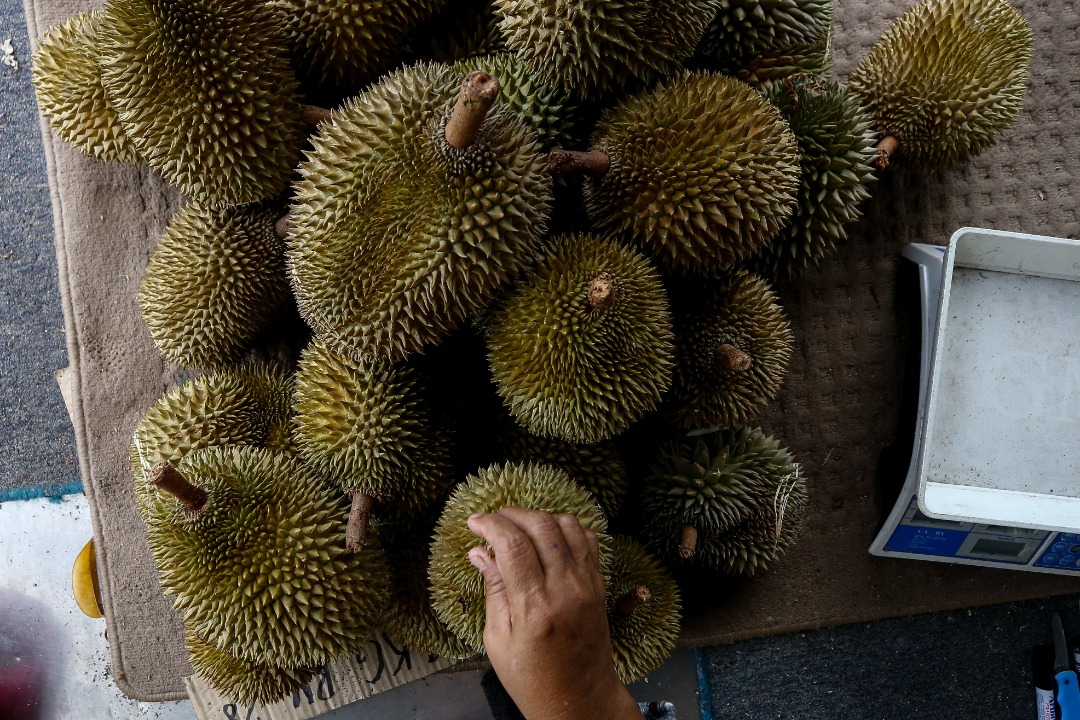Raub council’s rent-seeking on durian farmers ‘daylight robbery’: Tras rep
Chow Yu Hui says body’s proposed exercise will obstruct industry

Tras assemblyman Chow Yu Hui says the Musang King has given Raub great economical value for the past 20 years, creating a supply chain for locals. – Chow Yu Hui Facebook pic, October 26, 2021
KUALA LUMPUR – A Pahang representative has lambasted the Raub District Council over its plan to undertake a “rent-seeking” exercise on durian farmers via provisions in a new local draft plan, likening it to “daylight robbery”.
He described such a move as superficial, and a waste of time and resources. Many farmers who had produced the famous Musang King variety of the fruit have already been evicted.
Tras assemblyman Chow Yu Hui said the proposed move to make it compulsory for farmers to use special cartons and the council’s Musang King logo on each durian – and also instal Radio Frequency Identification (RFID) chips on all the fruits – is unnecessary.
“The intention of this rent-seeking exercise is clear: it is to take a piece from the blood, sweat, and tears of durian farmers,” he told The Vibes.
“The Musang King is already internationally renowned because of its quality, and (forcing) the council’s durian logo is not helpful to the industry at all.”
He pointed to other commodities such as tea leaves and vegetables from Cameron Highlands that have earned their fame without having district council logos stuck on them.
Yesterday, The Vibes reported that the draft plan’s objection period – which ended on October 21 – proposes the creation of an “agro-hub” that will see the favourite and expensive Musang King variety being cultivated on a wider scale.
With the reasoning of “strengthening Raub’s financial standing”, the draft plan seeks to impose “commissions” on these farmers.
An excerpt of the draft also noted that the council will “compel the usage of Raub Musang King logos and special cartons to promote the fruit overseas and locally”.
It said this exercise alone will generate between RM4 million and RM6 million annually for the council.
However, Chow countered that the proposed exercise would carry “zero benefits”, claiming that it would harm and obstruct the durian industry.
KUALA LUMPUR – A Pahang representative has lambasted the Raub District Council over its plan to undertake a “rent-seeking” exercise on durian farmers via provisions in a new local draft plan, likening it to “daylight robbery”.
He described such a move as superficial, and a waste of time and resources. Many farmers who had produced the famous Musang King variety of the fruit have already been evicted.
Tras assemblyman Chow Yu Hui said the proposed move to make it compulsory for farmers to use special cartons and the council’s Musang King logo on each durian – and also instal Radio Frequency Identification (RFID) chips on all the fruits – is unnecessary.
“The intention of this rent-seeking exercise is clear: it is to take a piece from the blood, sweat, and tears of durian farmers,” he told The Vibes.
“The Musang King is already internationally renowned because of its quality, and (forcing) the council’s durian logo is not helpful to the industry at all.”
He pointed to other commodities such as tea leaves and vegetables from Cameron Highlands that have earned their fame without having district council logos stuck on them.
Yesterday, The Vibes reported that the draft plan’s objection period – which ended on October 21 – proposes the creation of an “agro-hub” that will see the favourite and expensive Musang King variety being cultivated on a wider scale.
With the reasoning of “strengthening Raub’s financial standing”, the draft plan seeks to impose “commissions” on these farmers.
An excerpt of the draft also noted that the council will “compel the usage of Raub Musang King logos and special cartons to promote the fruit overseas and locally”.
It said this exercise alone will generate between RM4 million and RM6 million annually for the council.
However, Chow countered that the proposed exercise would carry “zero benefits”, claiming that it would harm and obstruct the durian industry.

According to the Tras assemblyman, the Raub District Council’s rent-seeking exercise will increase the burden on farmers as well as the price of durian, which will affect the fruit’s appeal in the international market amid strong competition from Thai producers. – The Vibes file pic, October 26, 2021
He said it would increase the burden of farmers and the price of durian, as well as affect the Malaysian fruit’s appeal in the international market – especially in the face of strong competition from Thailand producers.
“It will affect the local market as consumers are very sensitive to retail prices,” he said. “It may open up space for abuse and corruption.”
Chow also said it is not the council’s responsibility to regulate the durian industry.
“Its main responsibility is to create a friendlier infrastructure and environment, besides maintenance of the marketplace and other infrastructure to allow SME (small and medium enterprise) durian farmers to maintain their livelihoods and farm in calmness.”
He added that the Musang King product had given Raub great economical value for the past 20 years – creating a supply chain for locals involving fertilisers, processing plants, durian by-products, and agro-tourism.
He urged the council to consult and hold dialogues with farmers before it comes up with a more detailed policy.
“The best solution to build up the agriculture in Raub, Pahang, or even Malaysia is to revamp the land policy,” he said.
“The land policy should be more farmer-friendly, but not consortium-friendly. The government should prioritise the allocation of land to individual farmers and not corporates.”
Farmers not consulted on plan
Meanwhile, the Save Musang King Alliance (Samka) – which is representing the farmers – said it was blindsided by the plan as the farmers were not consulted even though they are the main stakeholders in the proposal.
Its spokesman Wilson Chang said the decision was made “from the top-down”.
“The draft plan is another exercise of rent-seeking, where durian farmers need to pay for RFID and mandatory logos that are unnecessary and redundant,” Chang told The Vibes.
“Musang King durians from Raub are widely recognised locally and internationally, without any RFID and mandatory logos.
He said the local government’s intervention in the industry could be devastating as it might lead to corruption and cronyism.
“Secondly, excessive bureaucracy will burden farmers and slow down the development of the industry,” Chang said.
“Farmers have no confidence in the council in terms of quality control, any mistake made in a single brand may tarnish the (image of the) Malaysian Musang King and lose its competitiveness to other durians from Southeast Asian countries.
“The local government has mistaken its role, Samka reminds the council that they are not farmers or businessmen. They should serve the people by providing a more business-friendly environment – upgrading local infrastructure for the durian industry, instead of exploiting them.”
He added that the council should table discussions on land legalisation schemes together with durian farmers and the Pahang government.
“Revenue can be increased through tax collection and licensing fees for the durian industry,” he said.
He said it would increase the burden of farmers and the price of durian, as well as affect the Malaysian fruit’s appeal in the international market – especially in the face of strong competition from Thailand producers.
“It will affect the local market as consumers are very sensitive to retail prices,” he said. “It may open up space for abuse and corruption.”
Chow also said it is not the council’s responsibility to regulate the durian industry.
“Its main responsibility is to create a friendlier infrastructure and environment, besides maintenance of the marketplace and other infrastructure to allow SME (small and medium enterprise) durian farmers to maintain their livelihoods and farm in calmness.”
He added that the Musang King product had given Raub great economical value for the past 20 years – creating a supply chain for locals involving fertilisers, processing plants, durian by-products, and agro-tourism.
He urged the council to consult and hold dialogues with farmers before it comes up with a more detailed policy.
“The best solution to build up the agriculture in Raub, Pahang, or even Malaysia is to revamp the land policy,” he said.
“The land policy should be more farmer-friendly, but not consortium-friendly. The government should prioritise the allocation of land to individual farmers and not corporates.”
Farmers not consulted on plan
Meanwhile, the Save Musang King Alliance (Samka) – which is representing the farmers – said it was blindsided by the plan as the farmers were not consulted even though they are the main stakeholders in the proposal.
Its spokesman Wilson Chang said the decision was made “from the top-down”.
“The draft plan is another exercise of rent-seeking, where durian farmers need to pay for RFID and mandatory logos that are unnecessary and redundant,” Chang told The Vibes.
“Musang King durians from Raub are widely recognised locally and internationally, without any RFID and mandatory logos.
They became famous because farmers spent decades of sweat and tears using trial-and-error methods to develop and find out the best quality of durian fruits – not by using the local government’s branding.”
“Secondly, excessive bureaucracy will burden farmers and slow down the development of the industry,” Chang said.
“Farmers have no confidence in the council in terms of quality control, any mistake made in a single brand may tarnish the (image of the) Malaysian Musang King and lose its competitiveness to other durians from Southeast Asian countries.
“The local government has mistaken its role, Samka reminds the council that they are not farmers or businessmen. They should serve the people by providing a more business-friendly environment – upgrading local infrastructure for the durian industry, instead of exploiting them.”
He added that the council should table discussions on land legalisation schemes together with durian farmers and the Pahang government.
“Revenue can be increased through tax collection and licensing fees for the durian industry,” he said.

Save Musang King Alliance spokesman Wilson Chang says revenue can be increased through tax collection and licensing fees for the durian industry. – The Vibes file pic, October 26, 2021
Last year saw over 200 farmers evicted from their orchards in forest reserves – many of which had been in the family for half a century.
They were even stopped from harvesting their durians and, in what can be described as an act of pure spite in July this year, the state Forestry Department cut down some 15,000 Musang King trees in an area measuring 101ha in a forest reserve.
However, in early September, the Court of Appeal decided that a judicial review application by 204 Raub durian farmers will be heard at the Kuantan High Court.
This meant that an interim order preventing Pahang authorities from evicting the farmers still stands. – The Vibes, October 26, 2021
Last year saw over 200 farmers evicted from their orchards in forest reserves – many of which had been in the family for half a century.
They were even stopped from harvesting their durians and, in what can be described as an act of pure spite in July this year, the state Forestry Department cut down some 15,000 Musang King trees in an area measuring 101ha in a forest reserve.
However, in early September, the Court of Appeal decided that a judicial review application by 204 Raub durian farmers will be heard at the Kuantan High Court.
This meant that an interim order preventing Pahang authorities from evicting the farmers still stands. – The Vibes, October 26, 2021

No comments:
Post a Comment